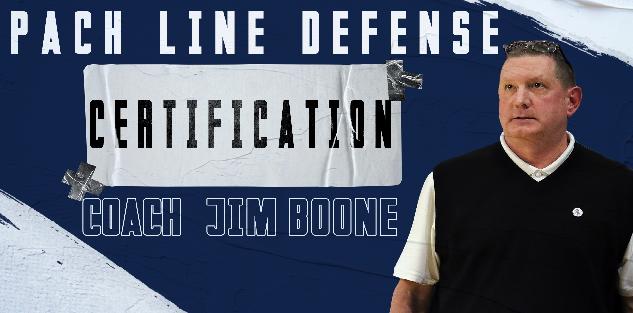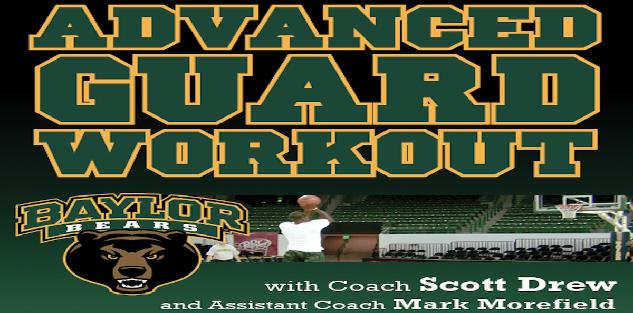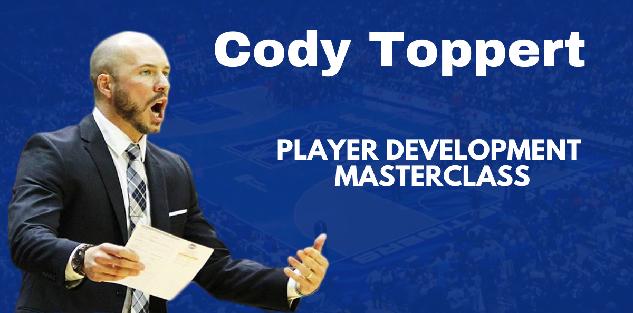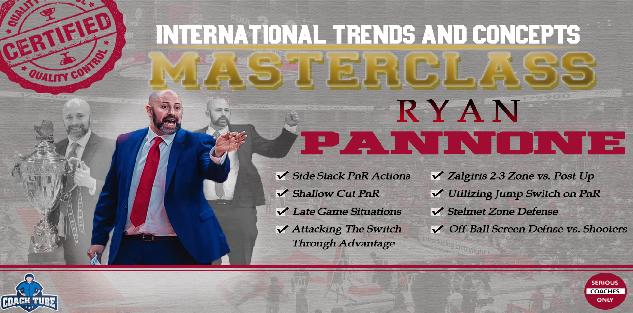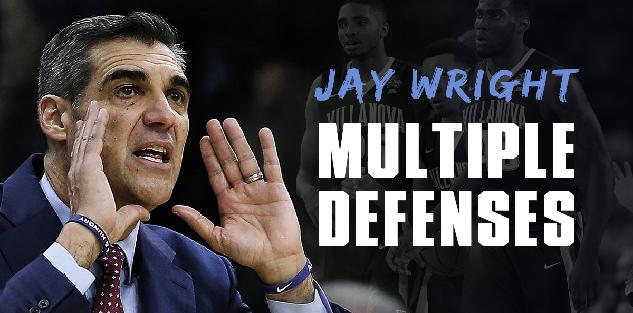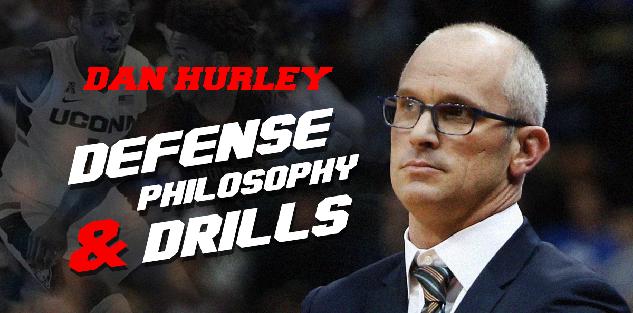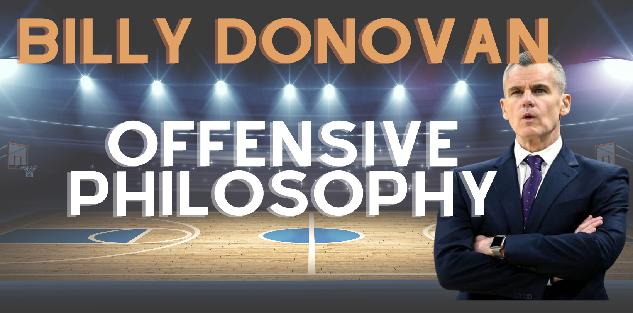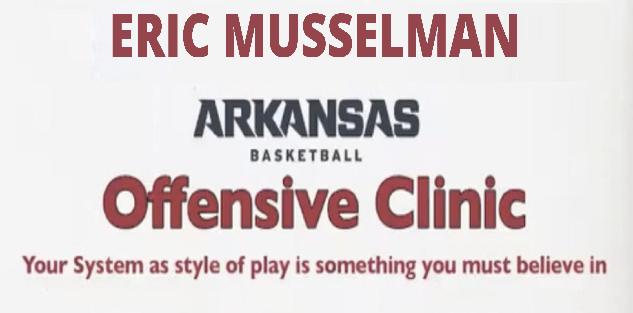Featured courses
- Two Great Game Situational Workouts For the Basketball Offseason by Grant Young
- Two Reads Basketball Players Must Understand Before Executing the Ball-Screen by Grant Young
- Two of LSU Coach Kim Mulkey’s Game-Winning Inbounds Plays by Grant Young
- Three Effective Early-Season Defensive Basketball Drills by Grant Young
- Four Essential Tips For Basketball’s 1-3-1 Zone Defense by Grant Young
- Four Zone Defense Drills to Strengthen Your Team by Grant Young
- How to Beat the Three Most Common Pick and Roll Coverages by Grant Young
- Two Drills to Improve Shooting at the Start of the Basketball Season by Grant Young
- Core Basketball Principles That Dallas Mavericks Coach Sean Sweeney Teaches by Grant Young
- Three Competitive Shooting Drills For Your Basketball Team by Grant Young
- How To Teach The ‘I’ Generation of Basketball Players by Grant Young
- Three Elite Drills to Begin a Basketball Practice With by Grant Young
- How to Build a Championship-Winning Basketball Team Culture by Grant Young
- Two of Texas Women’s Basketball Coach Vic Schaefer’s Tips For Team Culture by Grant Young
- Atlanta Dream WNBA Coach Brandi Poole’s Four Sets for Secondary Offense by Grant Young
- NC State Basketball Coach Brett Nelson’s 4 Crucial Point Guard Qualities by Grant Young
- Kentucky Coach Mark Pope’s Five Guard Rules For Offense by Grant Young
- McNeese State Basketball Coach Will Wade’s 4 Core Pillars by Grant Young
- 4 Tips To Instantly Improve Your Free Throw Shooting by Tyler Linderman
- Assemble a Championship-Caliber Basketball Rotation by Brandon Ogle
- Two of UConn Coach Dan Hurley’s Key Defensive Drills by Grant Young
- Four Post Moves All Basketball Forwards Should Have In Their Bag by Grant Young
- Four of Baylor Coach Nicki Collen’s Midseason Pick and Roll Adjustments by Grant Young
- WNBA Legend Sue Bird’s Two Tips For Attacking on Offense by Grant Young
- Houston Coach Kelvin Sampson’s Three Keys for Building a Basketball Program by Grant Young
- Two of Tom Izzo’s Top Michigan State Defensive Drills by Grant Young
- Four of Olympic Gold Medalist Coach Mechelle Freeman’s Relay Race Strategies by Grant Young
- Three Key Strategies Will Wade Uses to Build a Dominant Team by William Markey
- Five UConn Huskies Men’s Basketball Plays That You Can Use by Grant Young
- Three Tips for Maintaining Team Culture at the End of a Basketball Season by Grant Young
- Three Dribble Drive Motion Drills to Teach Your Basketball Team by Grant Young
- Three Dribbling Drills For Non-Primary Ball Handlers by Grant Young
- Four Advanced Ball Handling Drills For Basketball Guards by Grant Young
- Three Tips to Sharpen Your Post Player’s Footwork in Basketball by Grant Young
- These Three Pick and Roll Drills Are Crucial For Any Ball Screen Offense by Grant Young
- Three Closeout Drills to Improve Basketball Shooting Defense by Grant Young
- Three Tips to Perfect the Packline Defense in Basketball by Grant Young
- Four Keys to Executing the Read and React Offense in Basketball by Grant Young
- Three Tips to Develop Elite Basketball Shooters by Grant Young
- Three Crucial Keys to Executing the 5 Out Offense in Basketball by Grant Young
- These Three Offensive Sets Will Help You Beat Any Zone Defense by Grant Young
- Three Transition Basketball Drills To Play With More Pace by Grant Young
- Three 5 Out Offense Drills Any Basketball Coach Can Use by Grant Young
- Four Vital Techniques for a Motion Offense in Basketball by Grant Young
- Three Baseline Inbounds Plays To Win Your Basketball Team Games by Grant Young
- Four Drills For Sharpening the European Ball Screen Offense by Grant Young
- Three Positioning Tricks For a Basketball Zone Offense by Grant Young
- Three Rules to Perfecting Basketball's Lock Left Defensive System by Grant Young
- UCLA WBB Coach Cori Close’s Two Keys to Winning the Mental Game by Grant Young
- Four of Alabama Coach Nate Oats’ Favorite Basketball Drills by Grant Young
- Three Ways To Turn Transition Offense in Basketball Into Points by Grant Young
- Three Drills to Master Basketball's Pack Line Defense by Grant Young
- Three Transition Defense Drills to Halt Fast Breaks by Grant Young
- Four Offensive Rebounding Drills to Win Second Possessions by Grant Young
- 4 Defensive Technique Drills from Boston Celtics Assistant Coach Brandon Bailey by Marek Hulva
- 5 Drills to Improve Ball Handling by Tyler Linderman
- 13 FUNNY BASKETBALL GIFS by Alex
- BASKETBALL SPEED AND AGILITY: 8 QUESTIONS FOR COACHTUBE EXPERT RICH STONER by Jaycob Ammerman
- Defensive Strategies for Basketball by Ryan Brennan
- 4 Keys To Turning Your Program Into Championship Contender By Dallas Mavericks Coach Sean Sweeney by Marek Hulva
- 5 Components to Creating a Winning Basketball Program by Justin Tran
- Guide to Becoming a Lethal Scorer in Basketball by Justin Tran
- Zone Defense In the NBA Eastern Conference Finals by James Locke
- Mastering Court Mobility: Tips for Effective Movement in Basketball by Justin Tran
- 5 Basketball Shooting Drills: How to Develop a Sharpshooter by James Locke
- 6 Points of Emphasis for a Successful 5 Out Offense by Jaycob Ammerman
- Effective and Efficient Methods to Practice During the Basketball Season by Justin Tran
- Three Great Passing Drills From a Basketball Coaching Legend by Grant Young
- 7 Principles For Perfecting the Princeton Offense in Basketball by Grant Young
- How to Replicate A Modern NBA Offense by Grant Young
- Three Great Two-Ball Dribbling Drills For Basketball Development by Grant Young
- Two Rebounding Drills to Win Your Basketball Team Championships by Grant Young
- How to Improve Your Basketball Team’s Defense With the Shell Drill by Grant Young
- How Baylor Basketball’s Scott Drew Develops Elite Guard Play by Grant Young
- Off-Ball Movement Tips and Strategies: Lessons From the NBA Finals by James Locke
- Player Development: Scott Drew’s Tips for Producing NBA Guards by James Locke
- How to Execute a Spread Offense in Basketball by Grant Young
- Four Quality Quotes From Four Final Four Coaches by Grant Young
- A Guide to the Pack Line Defense by Alex Martinez
- 3 Defensive Build Up Drills to Improve Team Basketball Defense by Grant Young
- Battle of Two Great Coaches: Best Plays from the NBA Finals Contenders by Justin Tran
- 10 Creative Ways Athletic Programs Can Use a Video Board to Raise Money by Coach Williams
- How to Use 3 on 3 to Improve Your Basketball Team by Grant Young
- How to Defend the Pick and Roll by Grant Young
- Mastering Basketball Defense: Techniques, Drills, and Strategies for Success by Justin Tran
- Three Tips From The Coach Who Developed Giannis Antetokoumnpo by Grant Young
- 2023 NBA Draft: Skills and Technique from Top Prospects by Justin Tran
- From College to the Pros: Transitioning the Dribble Drive Offense by Justin Tran
- Positionless Basketball: Redefining Roles on the Court by Justin Tran
- Revolutionize Your Offense: Proven Concepts to Elevate Your Basketball Game by Justin Tran
- 5 Essential Fastbreak Drills Every Basketball Coach Should Know by James Locke
- How to Run a Circle Offense in Basketball by Grant Young
- Game-Changing Strategies: ATO Plays in the EuroLeague and Olympics by Justin Tran
- How to Stand Out at Basketball Tryouts by Grant Young
- How to Improve Your Basketball Team’s Transition Defense by Grant Young
- Indiana Fever GM Lin Dunn’s Two Keys For Women’s Basketball Coaches by Grant Young
- Strength Training Strategies Every Basketball Player Should Have by Grant Young
- A WNBA Basketball Coach’s Four Priorities In Transition Defense by Grant Young
- Three Adjustments to Make When Your Basketball Offense Isn’t Working by Grant Young
- Three Pillars to Applying Defensive Pressure on the Basketball Court by Grant Young
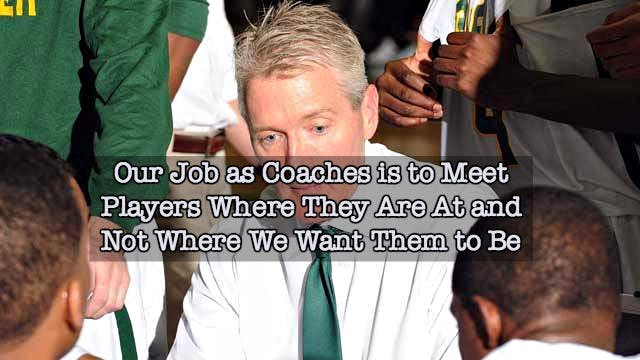
My Failure as a Coach
- By Tom Kelsey
Have you ever had one of the moments where you witness the actions of a coach, and you say to yourself, “I will never do that!”?
That was me.
I coached with Mark Gottfried (former head coach Murray State, Alabama, and North Carolina State), and would to refer to the NCAA men’s basketball tournament as the “greatest show on earth.” I couldn’t agree more.
One of my most vivid up-close moments came while watching this “greatest show on earth” up close. But unfortunately, it did not.
I had not yet started my coaching career. I knew I wanted to be around the game. Knew I loved the game and wanted to make an impact on young men. What should have been a defining moment in how I would approach my job and the players I worked each day, but it did not.
I knew I wanted to be different as a coach. One the day of this event I knew if I coached I would be a better example. Better at encouraging. Better in the heat of the moment of not losing my cool. Better at seeing the big picture. Better at not letting losing a game affect me.
Why could I not apply what I saw and what I knew to make me a better coach? It was a lack of focus.
In the coaching profession, we can lose focus because of a variety of things. Our ambition, our desire to succeed, our desire to well thought of by others.
Hopefully, my faults can help another coach from making the same mistake. Once we lose focus, our flaws become even more exposed. That is what happened with me.
I failed to do the one thing I promised myself I would not do.
I failed at loving my players unconditionally.
What is unconditional love? To love unconditionally is not to put conditions on the relationship.
I saw up close on college basketball’s biggest stages what I didn’t want to be like but still fell into the trap.
Before I was able to coach at Murray State, The University of Alabama, and LSU and be a part of the “greatest show on earth” I would get in my car to watch the games. If an NCAA tournament was within driving distance, I was going to be there.
I was just out of college and had not started my coaching career when I took off to watch the tournament. The tournament is set up is there are two games in the afternoon and two games in the evening. What a way to spend the day! For a basketball fan or coach, this is like the perfect day.
Each day and each game has many storylines. Of all the great games and players I have seen one moment stands out above all the rest. It was during the evening session and game featured one highly ranked team against a lower seeded team. The lower seed kept the game, entertaining by staying close. Late in the game they took the lead. It looked like they may pull the upset.
As the clock wound down, it felt like the favored team would win. The star player from the higher seeded team and future first-round draft got the ball in fantastic position near the basket. His team down by one point.
No one could guard him or match up with him. As he took the shot, it looked like it was going to go straight through the net. It just missed by bouncing off the rim and falling off to the side.
The buzzer sound and the game was over. A big upset. Everyone’s attention was on the winning team and their celebration.
For some reason, I kept my eyes on the star player. He was bending over right there in the middle of the floor. When you realize your season is over it hurts. When you realize your career is over it hurts more. To miss the shot that ended your career has to be unimaginable.
He knew his college career was over.
He would never wear those colors or uniform again. He was out there on the floor all alone. With his head in his jersey, you could almost feel his pain.
I was intently watching his coach walk across the floor. I wanted to see how he would react. The coach looked back and saw his player; he glanced at him and with a look showing no sympathy kept walking.
I still can see that look.
I understand how upset the coach was to lose the game. His team should have won easily.
They say a picture paints a thousand of words. The image portrayed a thousand words, Both from the perspective of the player and the coach.
In those few seconds, you could tell a story. The coaches look said so much. It was part disgust, part indifference to the kid, part shock at the loss. For the player, he could have been injured on the last play he could have been trying to get sympathy, or he could have been embarrassed his team lost to an inferior team. A lot happened in those few seconds. A lot happened in one image.
Life is like the game. A lot can happen in a few seconds. My wife will tell you the true colors will come out in situations like the one I just described. As a coach, if I was in the same position I am not sure how I would have reacted. It may be easy to say you would have come over and hugged the player. I watch a lot of coaches and cringe when I hear what they say to kids or how they react.
The losing coach would now have to face the media, then the alumni. No one was going to be happy about the outcome. The coach is the one getting the blame in losses like this. Coaches understand what comes with the job description.
I understand the emotions from both the player and the coach. Most likely the relationship had been through a lot of highs and lows. The coache=player relationship was had been going on for at least five years and maybe longer.
The recruiting process started long ago while the young man was in high school. The player was an incredible player and had an outstanding career.
Now, in an instant, it is over.
Unfortunately, the coach might be like a lot of us in how he reacted in that one moment. Maybe we treat our players the same way. You do well for us, and we will like you. You don’t deliver, and we will be disappointed.
The impression continues to stay with me. I see the young man and bending over on the court.
Maybe he never knew his coach left him out there on the floor. To him, since his head was down he may have never known his coach looked directly at him saw the emotional pain and walked away.
Maybe it wasn’t a big deal to him, but to most unconditional love is a big deal. At that moment the player-coach relationship came down to the missed shot and the lost game.
It was “what can you do for me?” Not trying to place blame on the coach, but it was a sad picture. It showed the relationship based on conditions.
How can you change? Here are three steps.
1. Show it those who are closest to you and know you best.
My children need to know I will love them no matter what, not just because they clean their room, not because they make good grades, and not because they do their jobs on time. They have to know deep down I will love them no matter what they do. They will mess up, and we will have our struggles. They know whatever happens, even if I am mad or my wife is upset at their actions, we still love them.
2. Show it to your team and how you coach
My players need to understand I love them and want them all to do well. They need to know there will be rules, but if they mess up, I will still love them. I do not love them more for winning than losing. I do not love them more for having a good practice than having a bad practice. There is not more love if they make the winning shot or miss the last second shot.
3. Stop attaching conditions in your relationships
There are no strings attached in unconditional love. The love is pure. When you begin to accept people for who they are and not what they can do for you, it makes your relationships stronger.
If you have unconditional love and begin to have patience with others, you will see your stress decrease dramatically. We only add to the problems in our own life by having high expectations of others. Then not accepting them if they don’t meet those high expectations.
After practice, this coach pointed at one of my players and said, ”I could never coach that young man.” I knew what he meant.
He didn’t need to say more.
The young man may have been a little rough around the edges. May have had a disposition that could turn others off. Looked like he had bad attitude. He thought of himself first before the team.
All those assumptions were probably correct.
Just a few years earlier I would have “never wanted to coach that young man” myself. Yes, he may not have been the most coachable at times.
But here is what I knew. I knew the young man's heart. I knew what he had been through in his life because I got to know his story.
Sure, in the past I knew the stories of most of my players but didn’t dig any further than that.
This young man changed how I coached. Why it took almost 25 years into my career, I don’t know.
As I heard the comment, “I could never coach that young man” I thought to myself, I have no choice. If I don’t coach him who will?
I was motivated to start accepting kids for who they were and not what I wanted them to be. So somehow a young man I would have kicked off the team the first week of practice in most situations we made it four years together.
Of all the positive things that have happened in my career, this one was maybe the one that made me the proudest. I have a photo of the two of us after his graduation. No doubt it is one of my favorite photos.
I have found nothing is as freeing for young athletes than being accepted they way they are. Our job as coaches is to meet them where they are and not where we think they should be. As difficult it may be as a coach treating them with unconditional love will make a tremendous impact on those you coach.
I think of the image I saw before I started coaching and why did it take so long to sink in.
That is the coach I no longer want to be.
I think about the players who will disappoint us in the future and how we can love them anyway.
That is the coach I hope to be.
I think of the coaches who can see past the imperfections and look at the bigger picture and the impact they have on their players.
That is the coach I want to be.

